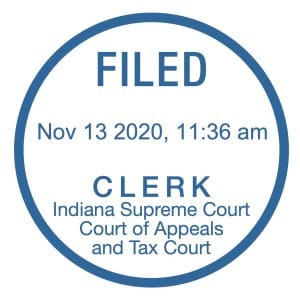A hen’s tooth grows in Bloomington: Court of appeals agrees to review ruling mid-trial in plan commission seat case

On Friday morning, a three-judge panel from the Indiana court of appeals decided unanimously that it would hear an appeal made in the middle of a trial about the rightful appointee to a Bloomington plan commission seat.

The case will decide who serves on Bloomington’s plan commission: Chris Cockerham or Andrew Guenther. Both are Republicans. Cockerham, the mayor’s pick, has been serving for a few months now and will continue to serve on the commission until the case is decided.
Friday’s ruling means the usual sequence of written legal memoranda submitted by the two sides can start. Now that it has permission to file its appeal, the city will do that, along with a brief in support. Guenther and GOP Monroe County chair William Ellis, who are represented by local Bloomington attorney Carl Lamb, will have a chance to file a brief responding to Bloomington’s arguments. Finally, Bloomington will get a chance to reply to the response.
Either side can ask for oral arguments to be heard. Whether oral arguments are heard is at the court’s discretion. The court can itself decide to hear oral arguments, even if neither side requests it.
Given the allowable timelines for each step in the rules of Indiana appellate procedure, it seems unlikely that a ruling will come on the appeal before year’s end. The lawsuit was filed in June of this year.
Each side filed a brief with the court of appeals arguing that the court should either accept the case, or not. [Bloomington’s memorandum in support] [Ellis and Guenther’s memorandum in opposition]
An initial ruling went against the city of Bloomington, when local judge Erik Allen, out of Greene County, denied Bloomington’s motion to dismiss the case. The case is being handled by Allen, a special judge, after Monroe County judges recused themselves.
Friday’s order means that the court of appeals has agreed to review Allen’s ruling, which was made in mid-August, to deny Bloomington’s motion to dismiss.
The court of appeals was not required to hear the appeal in the middle of the trial at the lower court. The special process for such an “interlocutory appeal,” made before proceedings at the lower court have reached a conclusion, gives the court of appeals discretion to review the ruling of a lower court judge.
In connection with the 2017 lawsuit over the state legislature’s squashing of Bloomington’s annexation plan , Bloomington argued against the state’s bid for interlocutory appeal by saying, “The First Circuit Court of Appeals has described interlocutory appeal as being as rare as hens’ teeth.”
The ruling in 2017 was in favor of Bloomington and left only toothless birds in the barnyard of that case.
Friday’s ruling went in Bloomington’s favor, so can be counted as adding one to the tally of local hen’s teeth.
The case involves a claim made by Monroe Republican Party chair William Ellis—that the appointment to fill a vacancy on the Bloomington plan commission at the start of the year was his to make. The claim is based on the idea that Bloomington’s mayor, Democrat John Hamilton, did not fill the vacancy in a timely way.
Key background to the case is that five of the seats on a plan commission in Indiana are appointed by the mayor. They have a partisan balancing requirement: No more than three of the five seats can be filled by members of the same party.
Currently serving in the other four seats on Bloomington’s plan commission are three Democrats and a Republican. That means the appointment to the disputed seat cannot be a Democrat. Both Cockerham, who has been serving in the seat for a couple of months, and Guenther, who filed suit in early June, are Republicans.
Ellis claimed authority to make what is normally a mayoral appointment by citing a state law that says if the vacancy is not filled by the mayor, then the county chair of the political party of the member whose term has expired makes the appointment.
Bloomington’s basic legal argument for dismissal rested on an undisputed fact: Kappas is the member whose term expired, and Kappas is not a Republican. It was that fact that led Bloomington to ask for a dismissal of the case, saying that Ellis and Guenther did not even have legal standing to bring the lawsuit.
If Kappas is not a Republican, Bloomington’s argument goes, then the state statute giving Kappas’s party chair the right to make the appointment cannot give the right to the Republican Party chair, which is Ellis.
The wrinkle in the case is that under the statutory definition, Kappas is unaffiliated with any political party. But Ellis and Guenther interpret the state statute defining party affiliation—for purposes of partisan balancing of a plan commission—to mean that an appointee has to have some party affiliation. They argue that because Kappas was unaffiliated with any party, his appointment to the plan commission in 2016 was not valid.
So Ellis and Guenther look to the party affiliation of Kappas’s predecessor, Republican Chris Smith, as the foundation of Ellis’s authority to fill the vacancy left by Kappas.
A key question of law that a decision in the case could wind up establishing: Does the state law defining partisan affiliation for partisan-balanced boards and commissions entail that an appointee have some affiliation or other?




Comments ()